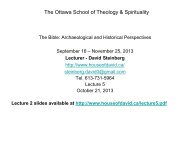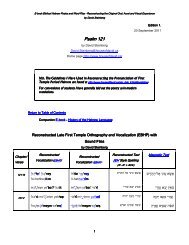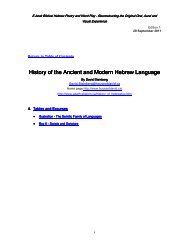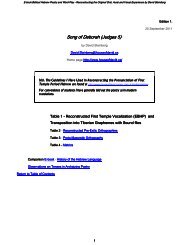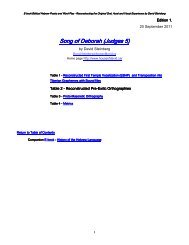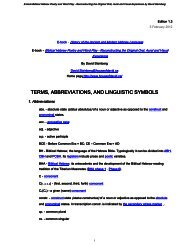Biblical Hebrew Poetry - House of David Steinberg
Biblical Hebrew Poetry - House of David Steinberg
Biblical Hebrew Poetry - House of David Steinberg
Create successful ePaper yourself
Turn your PDF publications into a flip-book with our unique Google optimized e-Paper software.
40<br />
E-book<br />
<strong>Biblical</strong> <strong>Hebrew</strong> <strong>Poetry</strong> and Word Play - Reconstructing the Original Oral, Aural and Visual Experience by <strong>David</strong> <strong>Steinberg</strong><br />
49 For the u prefix vowel <strong>of</strong> the piel participle I follow Blau 2010 §4.3.5.4.5. -<br />
The participle begins with m, which originally had the vowel u, based on the testimony <strong>of</strong> Akkadian,<br />
Classical Arabic, and Ugaritic....<br />
50 The loss <strong>of</strong> the short vowel under the prefix is exactly parallels in Arabic. Some dialects pronounce the<br />
participle <strong>of</strong> form II (= <strong>Hebrew</strong> piel) as [mqattil] and others retain the classic [muqattil]. Eg. [m c allim], [mu c allim]<br />
'teacher'.<br />
51 From Blau 2010 §4.3.5.6.4.<br />
...The (original) ṣere in the (hithpael)participle was long (in the pre-Tiberian period), as in every absolute<br />
noun, but short in the finite forms <strong>of</strong> the verbs, as proven by its alternation with pataḥ .<br />
52 Blau 1976/93 p. 124.<br />
53 Blau 2010 §4.3.5.2.6.1.<br />
As stated (see §4.3.4.2.1, p. 213), the construct infinitive is, as a rule, formally identical to the imperative,<br />
so that it was originally disyllabic as well, containing the same vowel in both syllables: *quṭul, *qaṭal, *qiṭil<br />
(see §4.3.5.2.4.1, p. 224). The prevailing form is *quṭul > פְּ עֹל (which has to be analyzed as containing<br />
long ō in the pre-Tiberian period, arising by secondary lengthening from original short o < u, as is the rule<br />
in absolute nouns). פְּע ֹל is formed even from verbs with characteristic a in the prefix-tense: י ֹ ִשְמַע ‘he will<br />
hear’, ( מֹ ַע ֹשְ .(לִ It appears that originally the prefix-tense and the construct infinitive had the same<br />
characteristic vowel; with the restriction <strong>of</strong> the yaf c il prefix-tense, the corresponding i-infinitive fell into<br />
desuetude as well. In III-laryngeal/pharyngeal verbs, the o <strong>of</strong> the prefix-tense and the imperative, being<br />
short, was assimilated to the laryngeal/pharyngeal to become a. In contrast, the long o <strong>of</strong> the infinitive<br />
was preserved (... see §4.3.7.3.5, p. 240), thus giving rise to the structure <strong>of</strong> a in the prefix-tense and the<br />
imperative in contrast to o in the construct infinitive. This pattern (a in the prefix-tense : o in the construct<br />
infinitive) spread to verbs that had original a in the prefix-tense, such as יִרְ כַּ ב ‘he will ride’ in contrast to<br />
the infinitive לִ רְ כֹּב , rather than *lirkab. The vowel a in the infinitive has only been preserved in ל ֹ שְ כַּ ב ִ ‘to<br />
lie’ (alongside בֹּ שְ פַ ל ְ ,(בֹ שָ כְ בְּ ָך ִ ‘when being low’.<br />
4.3.5.2.6.1n. The i-infinitive was preserved mainly in weak verbs: לָ תֵ ת ‘to give’, לָ צֵ את ‘to go out’, ל ֹ שִ יר ָ ‘to<br />
sing’.... It is remarkable that these a-infinitives have pataḥ rather than qamaṣ, in spite <strong>of</strong> its reconstruction<br />
above as a long vowel! It appears that the pataḥ does not reflect the archaic a infinitive but instead<br />
exhibits the influence <strong>of</strong> Rabbinic <strong>Hebrew</strong> on the Masoretes. In Rabbinic <strong>Hebrew</strong>, the trend <strong>of</strong><br />
development has been reversed and infinitives (following ;ל as always in Rabbinic <strong>Hebrew</strong>) with a as the<br />
characteristic vowel spread in the wake <strong>of</strong> prefix-tenses with a .... In Rabbinic <strong>Hebrew</strong>, the construct<br />
infinitive was felt to be derived from the prefix-tense and was restructured according to it (as in לִ קּח ‘to<br />
.(לָ קַ חֵ ת , in contrast to biblical יִ קּח take’, in the wake <strong>of</strong> the prefix-tense<br />
54 See Blau 2010 1.15.3, 3.5.7.6.11. In 3.5.7.6.11 Blau wrote -



